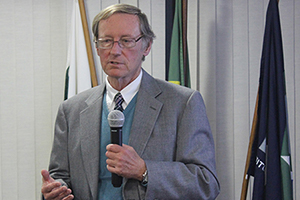Faculty Profiles
Nominate an Agnes Scott Faculty Member for a Profile
Professor Gus Cochran
Adeline A. Loridans Professor of Political Science

Gus Cochran
The accompanying picture is of Gus Cochran delivering a lecture on the US common law system to the Paraná Institute of Lawyers in Curitiba, Brazil, in June. Brazil has held a special place in Professor Cochran’s heart since he spent a couple of months in Itu, a small town near São Paulo, as a high school exchange student in 1963. His return, including revisiting the country and placing its legal system at the center of his research agenda, however, followed a long and circuitous path.
There were few opportunities to build on this exchange experience as an undergrad at Davidson, and instead of studying Brazil in grad school at Indiana and Chapel Hill, Cochran studied U.S. and Southern politics (background that eventually led to the publication of Democracy Heading South: National Politics in the Shadow of Dixie by the University Press of Kansas in 2001). The late 1960s and early 1970s were tumultuous times, an era of crisis (Vietnam), ferment (civil rights), and reform (Watergate), and interest in domestic politics took precedence in Cochran’s studies. A particularly provocative challenge to progressive change was posed by elite theory, which maintains that democracy is impossible. Carole Pateman’s theory of participatory democracy, with its insight that practice in making daily decisions, especially in the workplace, provided a recipe for strengthening democracy that might escape Michel’s “iron law of oligarchy" and spotlighted a research agenda focused on worker participation. A month-long research experience in Sweden studying that country’s co-determination law (medbestammandelagen) that ensures workers the right to a voice on all management decisions taught how vital law is in regulating the employment relationship. Hoping to understand how the law regulates employment in this country, Professor Cochran pursued a law degree from Georgia State University College of Law in the early 1990s. He researched the legality of worker participation through employee involvement committees (“We Participate, They Decide" in the 1995 Berkeley Journal of Employment and Labor Law) and and sexual harassment law, publishing Sexual Harassment and the Law: The Mechelle Vinson Case (also with UPK in 2004), the story of the first case to declare sexual harassment prohibited by Title VII of the 1964 Civil Rights Act.
In 2001, Professor Cochran returned to Brazil for the first time since 1963 with a seminar sponsored by the American International Education Exchange, and that travel-study adventure led him to frame a long-term research project to compare Brazilian and U.S. labor and employment law. The two countries take radically different approaches to protecting the rights of workers. Brazil uses a legislated model, adopting an extensive labor code that regulates even the most minute details of the employment relation, and has an independent labor court system to hear the many conflicts that arise between employees and their employers. The U.S. system, on the other hand, basically relies on private negotiations, either individually or collectively bargained, between employees and employers to determine the terms and conditions of employment. The traditional common law doctrine of at will employment (employees and employers may terminate employment at any time for any reason without legal consequences) has been modified by national law that protects workers’ rights against some types of discrimination and to bargain collectively, to partially offset the collectivized power of corporate capital, but within this broad framework established by federal law, the private parties set the terms of employment through negotiating. Both systems have advantages and disadvantages, but what particularly interests Professor Cochran is how the two systems are reacting to the pressures of globalization in a neoliberal era when the watchwords are flexibilization, privatization, deregulation, and marketization.
In pursuit of this research project, Professor Cochran has visited Brazil eighteen more times since his initial return. Between 2001 and 2007 Professor Cochran studied Brazilian labor law and labor courts, conducting interviews with judges, prosecutors, and lawyers in cities in Brasília and several regions of the country. In 2008 he spent two months as a visiting professor at Fundação Getúlio Vargas in Rio de Janeiro, and for the following three years he spent time in São Paulo volunteering each summer for the Instituto Observatório Social, an NGO that monitors multinational corporations’ compliance with environmental and labor laws. On his sabbatical during 2012-13 he was visiting professor at Pontífica Universidade Católica de Paraná (PUCPR) in Curitiba, Universidade Federal de Santa Catarina (UFSC) in Florianópolis, and Mackenzie Universidade Presbiteriano in São Paulo, opportunities that provided occasions to speak to university classes and conferences, judges’ schools, and lawyers’ associations. Since then he has returned to these universities in the south several times, last summer leading a discussion on the U.S. elections in a MA class in the graduate program in international relations at UFSC and giving a lecture on the common law system to the Paraná Institute of Lawyers.
Gus Cochran came to Agnes Scott College in the fall of 1973. He teaches courses on American politics and institutions such as corporations and media, constitutional and employment law, and modern political philosophy. He has served as department chair as well as pre-law adviser and has been active in faculty governance.
